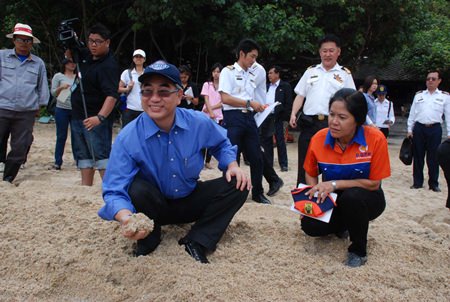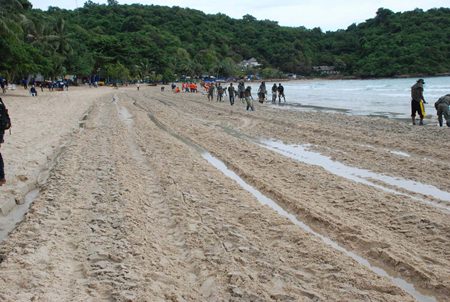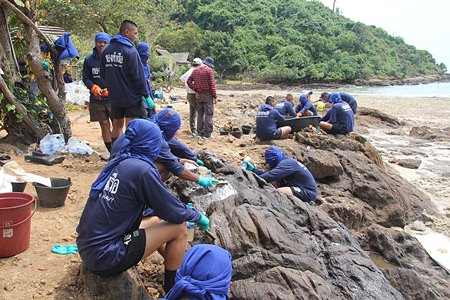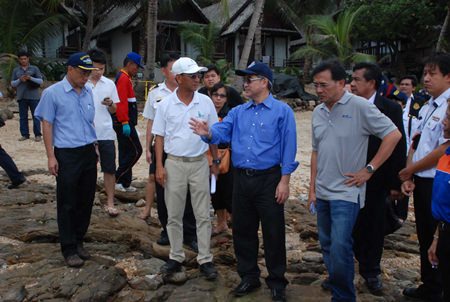Rayong officials plan to rebuild Koh Samet’s oil-stained beaches with new sand as authorities try to gauge how much of last month’s petroleum spill have affected marine life.
Phrao Bay beaches are starting to look normal again being blackened by more than 5,000 liters of oil that washed ashore from a 50,000-liter spill at a PTT Global Chemical Plc transfer pipe 18 miles off Rayong’s Maptaput Industrial Estate July 27. Non-stop work by PTT employees, Royal Thai Navy personnel and volunteers has removed nearly all the oil from the beach and Sarawuth Wannaprasert, assistant manager for the Ao Phrao Resorts, said the water is clearer, although authorities continue to test.
Pornthep Siriwanarangsan, director-general of the Disease Control Department, told the media Aug. 11 that the department had collected air samples from the area to monitor concentrations of benzene vapor and effects on human health every day since the leak. He said the latest tests showed air quality has now returned to “normal.”
 Natural Resources and the Environment Minister Vichet Kasemthongsri smiles as he checks the sand for a photo op on Ao Phrao beach.
Natural Resources and the Environment Minister Vichet Kasemthongsri smiles as he checks the sand for a photo op on Ao Phrao beach.
While PTTGC hauled away much of the tainted sand a week ago, the oil had seeped deep into the beachhead. On Aug. 6, Maptaput’s “Friend to Friend” group and Koh Samet authorities began digging up and overturning sand, hauling away the badly soaked and using sieves to clean what could be saved.
The work continued through Aug. 10, when the island hosted a “big cleanup day” to regain tourist confidence, with residents, tourists and volunteers wiping down rocks, washing plants and showing off the progress to 25 prominent travel agents and the media.
Natural Resources and the Environment Minister Vichet Kasemthongsri was on hand for the 11 a.m. to 4 p.m. event, presiding over religious rites beforehand to seek blessings and apologize to spirits at the island’s Laungpu Dam and Chaomae Tabtim shrines. He then grabbed towels and joined are volunteers and students from local neighborhoods, agencies and organizations to get the beach ready to reopen.
Once environmental officials decide the cleaning effort has reached its limit, Koh Samet authorities plan to bring in boats to spray the Phrao Bay beaches with new sand, hoping the rebuilt shoreline will bring back tourists that fled in droves after the spill.
About 300 souvenir vendors at Nuanthip Pier in Phe, on the mainland, rallied to alert the government to the tourist problem. They urged Prime Minister Yingluck Shinawatra to visit the pier market and Koh Samet to hear their complaints and help bring tourists back.
While the beaches are looking healthier, the same cannot be said of the marine life under the sea.
Marine and Coastal Resources Department Director-General Noppon Srisuk said agency tests found that some marine life had been reduced by up to 20 percent and that some coral reefs in the oil slick-affected bay have been killed off by bleaching.
Divers examined reefs and sea beds down to four meters at Noi Na, Laem Ya, Ao Lung Dam, Ao Kew Nha Nok, Ao Phai, Ao Look Yon, Koh Kudee, Koh Kham – Kruai, Koh Pla Teen, and the northern area of Ao Phrao. Preliminary results showed most of the intertidal zone had been tainted by oil with 10-20 percent of the marine life in Phrao Bay killed, especially stone crabs, snails, and oysters.
Several colonies of coral south of spill also were found bleached, Noppon said, acknowledging that other causes could be responsible for the coral death.
Five Phuket-based marine biologists also examined the area, coming up with similar findings, although they admitted the damage was less than they feared.
“We did not find any remains or evidence of endangered species being washed ashore, even a week after the oil spill,” Phuket Marine Biological Center Director Ukkrit Satapoomin told the media.
Nonetheless, Noppon said Marine and Coastal Resources Department plans to sue PTT Global Chemical within a year after completely assessing the damage caused by the spill.
The company said the spill occurred when a floating pipe used to transfer oil from offshore tankers to its Maptaput refinery broke. The Energy Ministry launched its own investigation, including whether negligence was involved, and planned to announce its findings Aug. 14, after press time.
Hoping to head off even more legal action, PTTGC has already begun paying off local residents and fishermen. On Aug. 10 the company presented 400 fishermen with 30,000 baht each.
Deputy Premier Plodprasop Suraswadi, however, has called on the company to establish a fund to pay future compensation, as well as promote environmentalism and tourism on Koh Samet.







